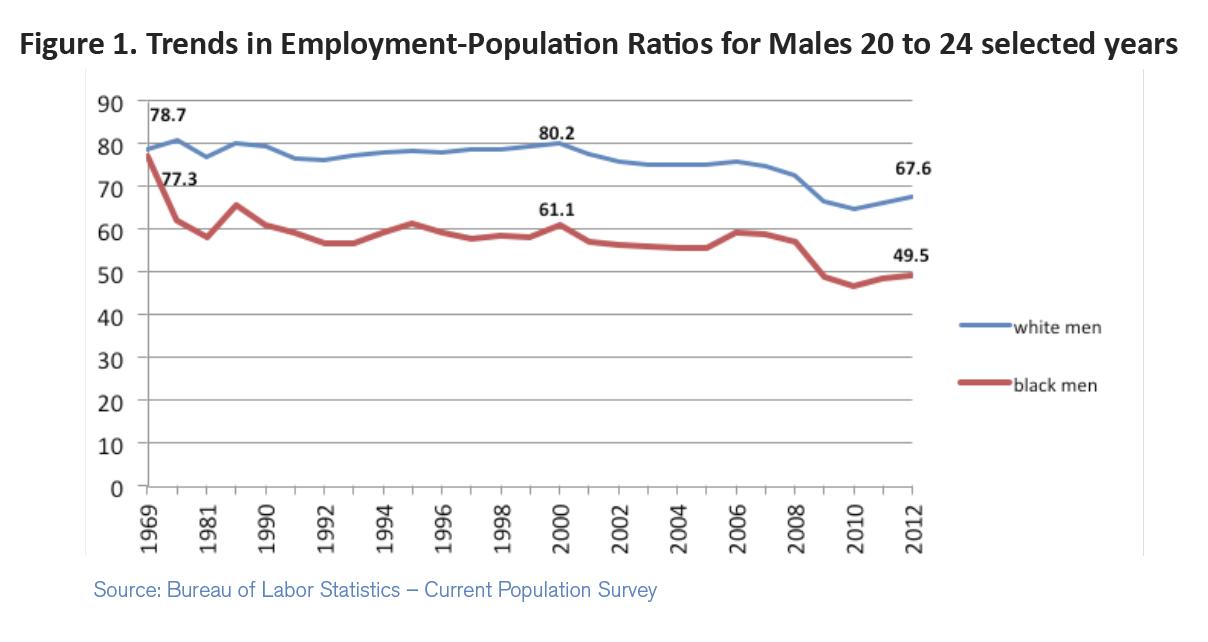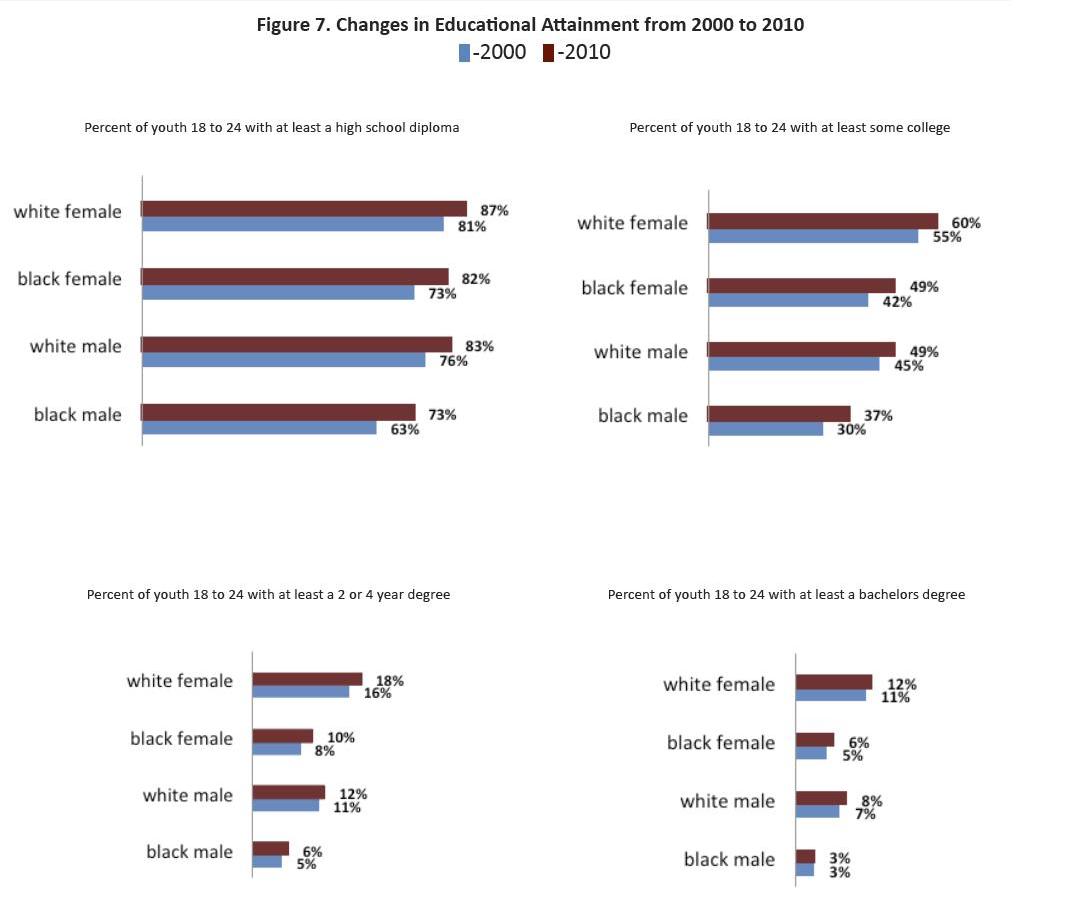In early October, the Center for Law and Social Policy (CLASP) released a report entitled  “Feel the Heat!” that details the economic status of black men in the United States. Author Linda Harris discusses this group’s high unemployment rates, which she attributes to high incarceration rates, low graduation rates, and a lack of support systems to help black men out of this low-income trap. “Feel the Heat!” that details the economic status of black men in the United States. Author Linda Harris discusses this group’s high unemployment rates, which she attributes to high incarceration rates, low graduation rates, and a lack of support systems to help black men out of this low-income trap. |
|
So writes Teresa Kroeger (cepr.net) in edited excerpts from the original article* entitled Addressing Chronic Black Male Unemployment.
[This article is presented by Lorimer Wilson, editor of www.FinancialArticleSummariesToday.com and www.munKNEE.com and the FREE Market Intelligence Report newsletter (sample here – register here) and may have been edited ([ ]), abridged (…) and/or reformatted (some sub-titles and bold/italics emphases) for the sake of clarity and brevity to ensure a fast and easy read. This paragraph must be included in any article re-posting to avoid copyright infringement.]Comparing Employment Rates Black men have significantly lower employment rates than other demographic groups, but this wasn’t always the case. In 1969, the employment rates for men between the ages of 20 and 24 were about 77% for blacks and 79% for whites. By 2012, the employment rate for young black men dropped to less than 50%, while young white men were…at almost 68%. Source: Feel the Heat!The report notes that young black men often lack support systems and early opportunities to properly prepare them for the job market. They enter the workforce at a disadvantage that can continue throughout their lives. Their lack of skills and experience leads to higher unemployment rates, lower wages, and fewer advancement opportunities than their white peers. The CLASP report also discusses the connection between the unemployment rates of black men and the low educational attainment and high incarceration rates of this group. Comparing Levels of Education The educational attainment of black men still trails significantly behind their white male counterparts. The high school graduation rate for black men, currently at 73%, is still 10 percentage points behind that of white men. Black men are also half as likely as white men to obtain a college degree by age 24. These educational discrepancies have lasting effects for young black men, especially as barriers to obtaining higher-wage jobs. Click for larger version Source: Feel the Heat!Comparing Extent of Incarceration According to the Bureau of Justice Statistics, one in three black men can expect to go to prison in their lifetime. That is an astonishingly high rate that is nowhere near comparable to that of white men. For men ages 18-19, the imprisonment rate of black men is nine times higher than white men; for ages 20-24, the rate is seven times higher for blacks. Comparing Length of Periods of Unemployment Incarceration and long-term unemployment can lead to workers becoming unemployable. As a result, high unemployment rates today can also harm future chances of employment. Black men are more likely to be unemployed for a longer period of time, on average six weeks longer than the national average. Comparing Weekly Earnings In addition to lower employment rates, on average black men earn $217 less per week than white men. According to the report, a large part of this disparity can be accounted for by the disproportionate concentration of black men in low-wage occupations and part-time jobs. Of all black men in the workforce, nearly half work in the lowest-earning occupational sectors. The report attributes these outcomes to low education and high incarceration rates. Conclusion According to CLASP, young black men deserve better support systems to help them overcome the barriers to finishing school, staying out of prison, and getting ahead in the job market. The paper argues that greater assistance in early education would have tremendous effects on the income of black men and the economic growth of the nation as a whole. [Editor’s Note: The author’s views and conclusions in the above article are unaltered and no personal comments have been included to maintain the integrity of the original post. Furthermore, the views, conclusions and any recommendations offered in this article are not to be construed as an endorsement of such by the editor.]*http://www.cepr.net/index.php/blogs/cepr-blog/addressing-chronic-black-male-unemployment |
 munKNEE.com Your Key to Making Money
munKNEE.com Your Key to Making Money





Where does the hispanic team fall?
This comment is more on the title of this article than the content, and here’s why. I’ve never actually seen believable figures for the unemployed. What we get to see are figures for the “unemployed in legal businesses”. There is a large part of society that is employed in what is politely calleds the informal sector. I’m not trying to be funny when I say that gang members are rarely unemployed; many prisoners are employed at least part-time; there are many freelance muggers, burglars, drug-dealers and the like who attend to their work as diligently as any high-flying executive in formal employment. So. My point is that millions of individuals (in the US, whose population is over 300 million) should not be classed as unemployed because they’re not unemployed.
I am a former Manager and sometime Director of the Cayman Islands Chamber of Commerce in the Caribbean; I have for twenty years been writing about our Islands’ economic and social problems – most of the time in local newspapers and recently (the past three years) in a personal blog. Early in 2011 I posted an item called “Working mothers” in response to a street-protest by some of our classified unemployeds, in which I noted “The last thing these protesting mothers needed or wanted was extra work. What they needed and wanted was extra money.” The link to the full post is given below, in case anybody here is interested. The post was addressed to the citizenry of Cayman, but it has a broader application.
http://barlowscayman.blogspot.com/2011/02/working-mothers.html